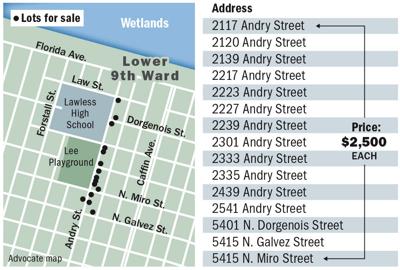
Lower 9th Ward Could Become Home Again with Subsidies from New Orleans Redevelopment Authority
BY JESSICA WILLIAMS | This email address is being protected from spambots. You need JavaScript enabled to view it. OCT 13, 2018 - 6:45 PM

Lots for sale in the Lower 9th Ward: The New Orleans Redevelopment Authority will offer 15 lots to homebuilders and prospective homebuyers at reduced prices, a small part of a broader effort to revitalize the still-recovering neighborhood.
Advocate graphic
Lower 9th Ward native Kendall Spears thinks the neighborhood where he grew up got shafted after Hurricane Katrina.
The neighborhood suffered the most catastrophic damage of any part of New Orleans from the storm and the subsequent flooding, but Spears doesn’t think the allocation of federal or state recovery dollars to the neighborhood reflected that devastation.
As a result, too few Lower 9 residents have been able to return and too few businesses have located there. City subsidy programs in recent years have been few and far between, he said.
But Spears, 28, is feeling more optimistic these days. He's hoping to be a new homeowner in his old neighborhood, under a city program aimed at lifting the Lower 9th Ward's prospects.
"I figure that part of my responsibility is to fix up where I'm from," he said. "And why wouldn't I want to live in my own neighborhood, given the right opportunity and chance?"
The program, run by the New Orleans Redevelopment Authority, offers subsidies to developers willing to turn some of the vacant Lower 9th Ward properties NORA owns into affordable single-family homes for purchase. It will also help would-be homebuyers like Spears with down payments and closing costs.
While the Lower 9th Ward was mostly inhabited by homeowners before the storm, some advocates have charged that redevelopment projects in the area have mainly targeted renters. They want NORA and other agencies that own lots in the Lower 9th Ward to market to would-be homeowners as well.
But developers and some city officials say the demand for homes in the Lower 9th Ward has been lackluster because the neighborhood lacks important services. They see it as a chicken-and-egg problem that might be remedied if public subsidies could be used, at least at first, to lure new renters.
NORA, which works to return vacant or blighted city properties to commerce, has had to try to please both sides. More than two years ago, it partnered with developers and other agencies in an effort to build 188 rental homes. One firm, Neville Development Group, broke ground on more than 40 of those rentals this summer.
And NORA this month solicited bids from eligible homebuilders for some of its vacant lots, its second such request in as many years. Its first, which was targeted at the Lower 9th and other neighborhoods, didn't net any applicants for the Lower 9th.
"Based on the comments and the feedback we've gotten from some of our partners in the community, we are hoping to get some good responses this time," NORA Executive Director Brenda Breaux said recently.
Breaux's agency owns roughly 600 lots in the Lower 9th Ward. Under the program, each eligible homebuilder may buy and redevelop up to 15 lots, many of them located along Andry Street.
The firms may buy the lots for 10 percent of their fair market value or $2,500, whichever is greater. NORA will then provide low-interest loans of as much as $100,000 per property to build homes. Firms can later have up to $75,000 of each loan forgiven.
Developers will be selected based on their experience, the strength of their proposals, their ability to repay the loans, the impact their projects would have on the surrounding area and their willingness to work with disadvantaged businesses.
The developers must also work with real estate agents to find prospective buyers.
The homebuyers, meanwhile, can get $25,000 in down payment assistance and potentially as much as $65,000, depending on the amount of financing the home's developer receives but does not use.
The program is generally open to people who earn no more than 80 percent of the area's median income — $36,750 this year for a single resident — though there may be some exceptions for people who earn more than that.
Public school teachers, law enforcement officers, firefighters and emergency medical technicians will get first choice of the homes for sale.
Developers have until Nov. 5 to apply. NORA will award lots to eligible developers in December.
The program is being funded by about $1 million in state housing grants.
The subsidies are needed because low-income people often can’t return to the neighborhoods they left after Katrina, Spears said. And few other city areas need as much help as does the Lower 9th Ward, which has whole blocks of empty lots, he said.
Spears recalled a lesson he learned as a child at Bunny Friend Playground in the nearby Upper 9th Ward, from a coach who told Spears and other boys to keep the park clean.
"Coach Melvin would say if we would pick up trash, other people would pitch in too," he said. "If you start to make things look better with this program, and put effort in, I believe the people around you will start to do better and make more investments."
View original article from The New Orleans Advocate here.
